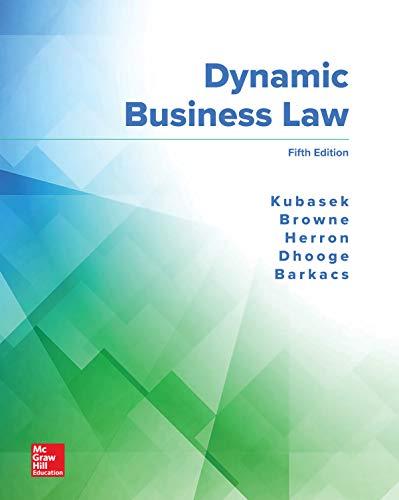Jay Cohen and Matthew Dilick formed several partnerships to commercialized tracts of land Cohen owned. The land
Question:
Jay Cohen and Matthew Dilick formed several partnerships to commercialized tracts of land Cohen owned. The land was transferred to the partnership so it could be developed and generate income. Cohen owned 80 percent interest in each partnership as a limited partner while Dilick owned 19 percent interest as a limited partner and 1 percent as a general partner.
In 2010, Cohen sued Dilick for using partnership assets for personal gain. The two feuded in court for four years. Eventually, the partnerships filed voluntary bankruptcy petitions. Ron Sommers was appointed as bankruptcy trustee for the partnerships. Sommers subsequently filed adversary proceedings in the bankruptcy case against Dilick and Cohen, asserting breach of fiduciary duty, breach of contract, defalcation, fraud, and other claims.
In a contemporaneous case, Dilick’s then wife sued Matthew Dilick for divorce. In 2015, Sommers intervened in the divorce suit, asking the divorce court to place constructive trusts on certain assets so Sommers as the trustee could collect if he obtained favorable judgment in the pending adversary proceeding.
The Dilicks and the trustee settled the divorce case. However, the divorce court ordered Sommers, the trustee, to pay Matthew Dilick’s attorneys’ fees. Sommers then appealed the judgment for attorneys’ fees.
One week after the appeal was filed, the partnerships regained solvency and the bankruptcy court dismissed the bankruptcy proceedings, in effect, also dismissing Sommers. Dilick subsequently filed a motion to dismiss the appeal against attorneys’ fees, arguing that Sommers’ authority as the trustee for the partnerships ended when the bankruptcies were dismissed, resulting in Sommers’ lack of standing.
Cohen then filed a motion seeking to substitute himself for Sommers as the appellant to litigate on behalf of the partnership. Cohen asserts that he has the right to defend the partnership in his capacity as a limited partner if the general partner refuses to do so. Does Cohen have the authority to prosecute the appeal as a limited partner? Why or why not?
Step by Step Answer:

Dynamic Business Law
ISBN: 9781260247893
5th Edition
Authors: Nancy Kubasek, M. Neil Browne, Daniel Herron, Lucien Dhooge, Linda Barkacs





